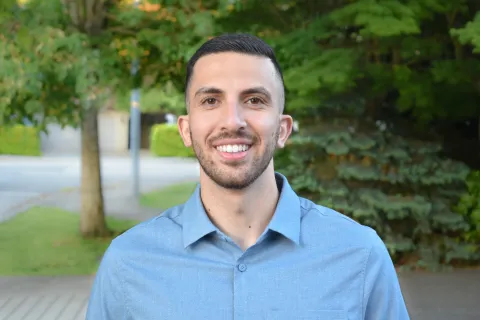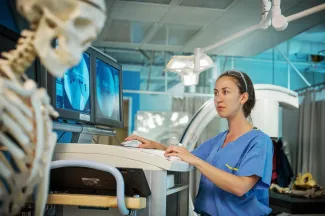"Don’t spend your life trying to find yourself. Focus on creating the person you want to be."

Oded Aminov
- Degree:
- Master of Applied Science
- Grad year: 2021
- Program:
- Campus: Vancouver
During my undergrad, I competed as a varsity Track & Field athlete while completing my science degree. In tandem, I leveraged my strong understanding of physics and mechanical engineering to design, build, and operate my own CNC and plastic injection machines. These innovations enabled my entrepreneurial passion and aided me in launching a company specializing in drone GPS tracking devices, which have been sold worldwide across five continents. I later pursued my Master’s in Biomedical Engineering, where I developed an unobtrusive surgical navigation system for shoulder replacement surgery. In the midst of my research, I also co-founded FLOWO2, which developed emergency ventilators for use during the COVID-19 pandemic. This system gained international recognition and has been featured in Forbes, CBC, Global News, CTV, and many more. When not at work, I play chess competitively and love solving complex puzzles. I also never refuse a game of volleyball.
Why did you choose to go into your field of study at UBC?
With extensive experience in mechanical and electrical innovation, as well as an academic background in biology, I was very interested in pursuing Biomedical Engineering. This program enabled me to apply my skillset towards meaningful contributions with a direct impact on enhancing human lives.
What has made your time at UBC memorable?
I will never forget the day I made the national championships qualifying standard as a varsity Track & Field athlete while competing on home turf. The outpouring of support I received from my fellow students gave me the encouragement I needed, which enabled me to achieve this great athletic accomplishment. This was truly a standout moment for me made possible through the UBC community, creating a memory that I will cherish forever from my time at this university.
Tell us about your experience in your program. What have you learned that is most valuable?
I entered my program eager to learn about medical devices, yet I gained so much more through real world experiences offered by the department. My research involved the development of a surgical navigation system for use in shoulder replacement surgery, which effectively guides an orthopaedic surgeon to a perfect implant placement. This helps to solve the common problem of implantation variability that occurs in the operating room when surgeons perform the conventional unassisted protocol.
One of the most valuable technical skills I acquired from my degree is learning to code in Python. I have since found numerous applications in which I have employed this knowledge, and I am certain this will continue to benefit my engineering capabilities as I progress into my future ventures. Overall, the technological competencies and experiences I am taking away from this program have equipped me well for contributing to novel advancements in the biomedical industry.
What advice would you give a student entering your degree program?
As a high jumper, I would continue to leap over the rising bar until ending the competition on a failure.
I like to make the analogy that you only know your true limits when you have reached the failure point. I recommend for new students to take on projects outside the classroom and push themselves to new heights. Work hard, never stop questioning, and never turn down an opportunity. As they say, there are no shortcuts to any place worth going.
What are your future plans to make a difference in our world?
I aspire to one day change the world with my innovations! I don’t know what the invention may be quite yet, nor which demographic it will benefit, but I will invest my efforts until my goal is achieved and I fulfill my combined passion for entrepreneurship and improving human lives.



